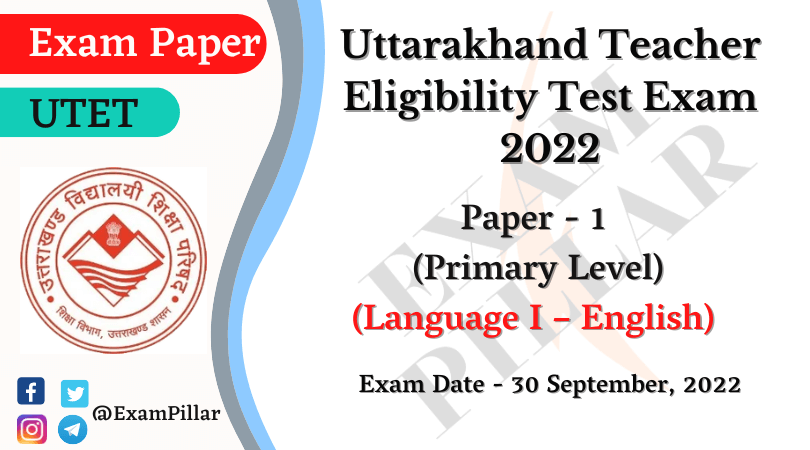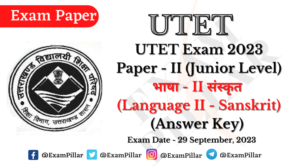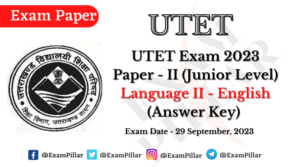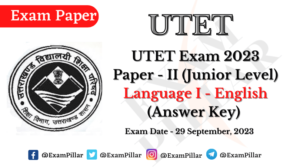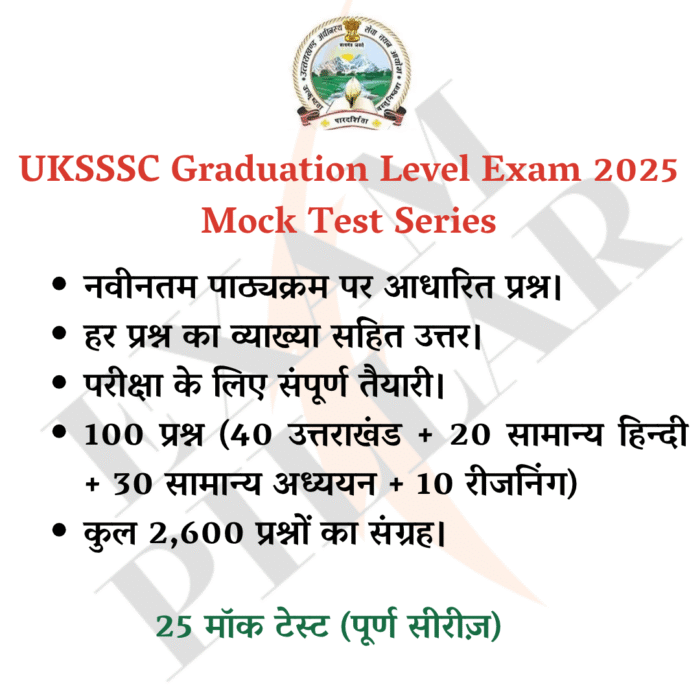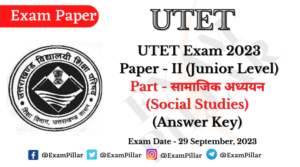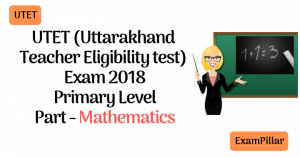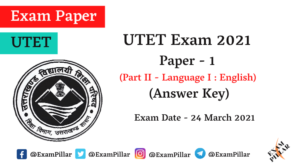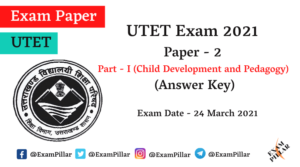उत्तराखंड विद्यालयी शिक्षा परिषद् (UBSE – Uttarakhand Board of School Education) द्वारा 30 सितम्बर, 2022 को UTET (Uttarakhand Teachers Eligibility Test) की परीक्षा का आयोजन किया गया। UTET (Uttarakhand Teachers Eligibility Test) Exam Paper 2022 – भाषा प्रथम – अंग्रेजी की उत्तरकुंजी (Language First – English Part Official Answer Key).
UBSE (Uttarakhand Board of School Education) Conduct the UTET (Uttarakhand Teachers Eligibility Test) 2022 Exam on 30 September, 2022. Here UTET Paper 1 Language First – English Subject Paper with Answer Key.
UTET (Uttarakhand Teachers Eligibility Test) Primary Level
(Class 1 to Class 5)
Exam :− UTET (Uttarakhand Teachers Eligibility Test)
Part :− भाषा प्रथम – अंग्रेजी (Language First – English)
Organized by :− UBSE
Number of Question :− 30
Exam Date :– 30th September, 2022
| UTET Primary Level Paper Answer Key | Link |
| UTET Exam 30 Sep 2022 – Paper – 1 (बाल विकास एवं शिक्षण विज्ञान) | Click Here |
| UTET Exam 30 Sep 2022 – Paper – 1 (Child Development and Pedagogy) | Click Here |
| UTET Exam 30 Sep 2022 – Paper – 1 (Language – I : Hindi) | Click Here |
| UTET Exam 30 Sep 2022 – Paper – 1 (Language – I : English) | Click Here |
| UTET Exam 30 Sep 2022 – Paper – 1 (Language – II : Hindi) | Click Here |
| UTET Exam 30 Sep 2022 – Paper – 1 (Language – II : English) | Click Here |
| UTET Exam 30 Sep 2022 – Paper – 1 (गणित ) | Click Here |
| UTET Exam 30 Sep 2022 – Paper – 1 (Mathematics) | Click Here |
| UTET Exam 30 Sep 2022 – Paper – 1 (पर्यावरण अध्ययन) | Click Here |
| UTET Exam 30 Sep 2022 – Paper – 1 (Environmental Studies) | Click Here |
UTET Exam 2022 Paper – 1 (Primary Level) Official Answer Key
Part – (Language First – English)
Direction (Q. No. 31 – 33) : Point out the error in the following sentences. If there is no mistake, the answer is ‘No error’.
31. I and Tina will go to the market in the evening.
(A) I and Tina
(B) will go to the market
(C) in the evening
(D) No error
Show Answer/Hide
32. I would never apologise if I were you.
(A) I would
(B) never apologise if
(C) I were you
(D) No error
Show Answer/Hide
33. So quickly did she ran upstairs that she overtook me.
(A) So quickly
(B) did she ran upstairs
(C) that she overtook me
(D) No error
Show Answer/Hide
34. In the following sentence, omit ‘too’ without changing its meaning and select the most appropriate option for it-
She is too poor to buy costly books.
(A) She is so poor to buy costly books.
(B) She is very poor to buy costly books.
(C) She is so poor that she can’t buy costly books.
(D) She is so poor that she could not buy costly books.
Show Answer/Hide
35. The study of words and their meanings is known as
(A) Phonetics
(B) Syntax
(C) Linguistics
(D) Semantics
Show Answer/Hide
36. Which one of the following is not a language component
(A) Grammar
(B) Speech
(C) Manuscript
(D) Sound system
Show Answer/Hide
37. Home language is ______ natural way.
(A) taught
(B) promoted
(C) acquired
(D) learnt
Show Answer/Hide
38. At primary level, the objective of teaching a language is
(A) Basic Interactive Communicative Skills (BICS)
(B) Cognitive Advanced Language Proficiency (CALP)
(C) Memorisation of text book
(D) Ability to write question answer
Show Answer/Hide
39. The most important aspect of an effective language classroom is to provide learners with an opportunity to
(A) interact
(B) interfere
(C) assess
(D) imitate
Show Answer/Hide
40. What is the ‘task’ in task-based language learning?
(A) A piece of work which enables learners to do an activity.
(B) A piece of work for the parents to do their children’s homework.
(C) A piece of activity for teachers to do in the classroom.
(D) A piece of work which exposes learners to language.
Show Answer/Hide
Direction (Q. No. 41 to 44) : Read the passage given below and answer the questions that follow by selecting the most appropriate option.
Read not to contradict and confuse, nor to believe and take for granted, nor to find talk and discourse but to weigh and consider. Some books are to be tasted, others to be swallowed, and some few to be chewed and digested. That is some books are to be read only in parts; others to be read, but not curiously; and some few to be read wholly, and with diligence and attention. Some books may also be read by deputy, and extracts made of them by others but that would be only in the less important arguments and the meaner sort of books; else distilled book are like common distilled waters, flashy things. Reading maketh a full man, conference a ready man, and writing an exact man.
41. What should be the purpose of reading a book?
(A) To understand the contents
(B) To weigh and consider
(C) To contradict
(D) To take it for granted
Show Answer/Hide
42. Why are some books to be tasted?
(A) To be read with great care
(B) To be read with great attention
(C) To be read only in parts
(D) To be read for fun
Show Answer/Hide
43. How is man’s character influenced by the art of writing?
(A) It makes him an exact man
(B) It makes him a great writer
(C) It makes him a ready man
(D) It makes him a full man
Show Answer/Hide
44. What is meant by ‘Chewed and digested’?
(A) Understood without any effort
(B) Partly read and understood
(C) Thoroughly read and understood
(D) None of the above
Show Answer/Hide
Direction (Q.No. 45) : Out of the given alternatives, choose the one that is the most similar in meaning to the underlined word in the sentence
45. He had to curtail his leave as a lot of work was pending in his office.
(A) Cancel
(B) Extend
(C) Shorten
(D) Postpone
Show Answer/Hide

